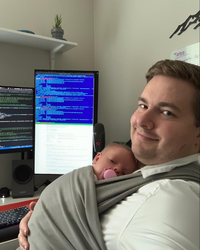In the Summer of 2021, Damyn Chipman had the incredible opportunity to participate in an internship with Lawrence Livermore National Laboratory (LLNL). Chipman, a Computing PhD student in the Computational Math, Science and Engineering emphasis, received his Bachelor’s in Applied Physics at Brigham Young University. When asked why he chose this particular internship, Chipman said, “I was looking for experience at a national laboratory and have wanted to work at LLNL. I had contacts from working with Mission Support and Test Services (MSTS), and that experience and those contacts helped me get connected with people at the lab. I applied online and they reached out.”
During his internship, Chipman acted as a High Energy Density Physics Intern and worked in the Nuclear Data Team within the Weapons and Complex Integration Directorate, contributing to the lab’s nuclear data codes. “I aligned features between FUDGE (For Updating Data and Generating Evaluations) and GIDI+ (General Interaction Data Interface), which are two codes used in the processing of nuclear data. The main contributions I added dealt with a method of solving the Boltzmann equation called the MultiGroup method. The MultiGroup method relies on nuclear data such as cross sections and transfer matrices, which FUDGE and GIDI+ process for the physics application developers.”
A typical day during the internship consisted of developing in Python and C++, attending meetings to report progress and communicate with the team, and attending lectures put on by the lab. We asked Chipman about the best part of the internship, and he said, “The lectures were incredibly interesting! I attended lectures on the history of the nuclear weapons program through the lens of the lab and other interesting physics lectures. To be able to hear from some of the brightest scientists in the country from the lab is a unique experience.” Even with all of these incredible experiences, Chipman said the most awesome part of his summer was the birth of his second child:

Currently, Chipman works with his advisor, Dr. Donna Calhoun, in developing a fast and scalable elliptic PDE solver on adaptive meshes. They are incorporating a method called the Hierarchical Poincare-Steklov (HPS) method into an adaptive mesh PDE library called ForestClaw. After completing his Ph.D., Chipman hopes to get a post-doc position with one of the labs.